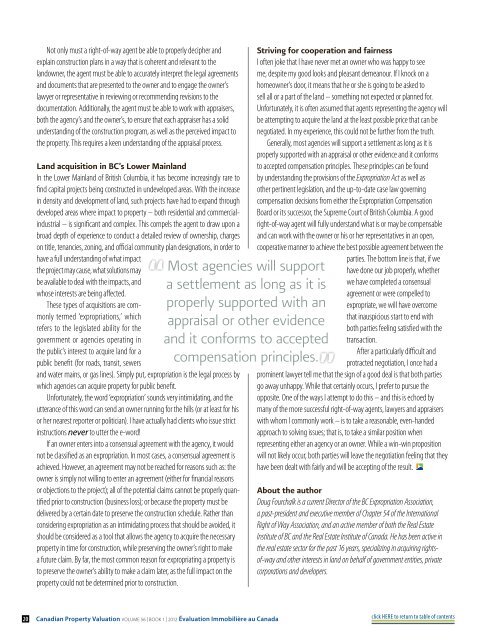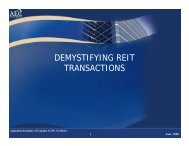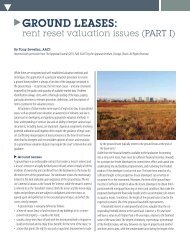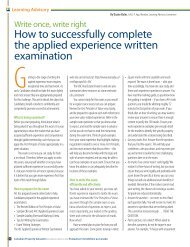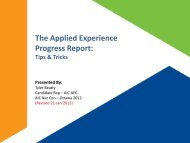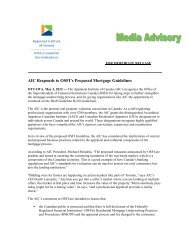Land acquisition Land acquisition Land acquisition - Appraisal ...
Land acquisition Land acquisition Land acquisition - Appraisal ...
Land acquisition Land acquisition Land acquisition - Appraisal ...
- No tags were found...
You also want an ePaper? Increase the reach of your titles
YUMPU automatically turns print PDFs into web optimized ePapers that Google loves.
Not only must a right-of-way agent be able to properly decipher and<br />
explain construction plans in a way that is coherent and relevant to the<br />
landowner, the agent must be able to accurately interpret the legal agreements<br />
and documents that are presented to the owner and to engage the owner’s<br />
lawyer or representative in reviewing or recommending revisions to the<br />
documentation. Additionally, the agent must be able to work with appraisers,<br />
both the agency’s and the owner’s, to ensure that each appraiser has a solid<br />
understanding of the construction program, as well as the perceived impact to<br />
the property. This requires a keen understanding of the appraisal process.<br />
<strong>Land</strong> <strong>acquisition</strong> in BC’s Lower Mainland<br />
In the Lower Mainland of British Columbia, it has become increasingly rare to<br />
find capital projects being constructed in undeveloped areas. With the increase<br />
in density and development of land, such projects have had to expand through<br />
developed areas where impact to property – both residential and commercialindustrial<br />
– is significant and complex. This compels the agent to draw upon a<br />
broad depth of experience to conduct a detailed review of ownership, charges<br />
on title, tenancies, zoning, and official community plan designations, in order to<br />
have a full understanding of what impact<br />
the project may cause, what solutions may<br />
be available to deal with the impacts, and<br />
whose interests are being affected.<br />
These types of <strong>acquisition</strong>s are commonly<br />
termed ‘expropriations,’ which<br />
refers to the legislated ability for the<br />
government or agencies operating in<br />
the public’s interest to acquire land for a<br />
public benefit (for roads, transit, sewers<br />
and water mains, or gas lines). Simply put, expropriation is the legal process by<br />
which agencies can acquire property for public benefit.<br />
Unfortunately, the word ‘expropriation’ sounds very intimidating, and the<br />
utterance of this word can send an owner running for the hills (or at least for his<br />
or her nearest reporter or politician). I have actually had clients who issue strict<br />
instructions never to utter the e-word!<br />
If an owner enters into a consensual agreement with the agency, it would<br />
not be classified as an expropriation. In most cases, a consensual agreement is<br />
achieved. However, an agreement may not be reached for reasons such as: the<br />
owner is simply not willing to enter an agreement (either for financial reasons<br />
or objections to the project); all of the potential claims cannot be properly quantified<br />
prior to construction (business loss); or because the property must be<br />
delivered by a certain date to preserve the construction schedule. Rather than<br />
considering expropriation as an intimidating process that should be avoided, it<br />
should be considered as a tool that allows the agency to acquire the necessary<br />
property in time for construction, while preserving the owner’s right to make<br />
a future claim. By far, the most common reason for expropriating a property is<br />
to preserve the owner’s ability to make a claim later, as the full impact on the<br />
property could not be determined prior to construction.<br />
Striving for cooperation and fairness<br />
I often joke that I have never met an owner who was happy to see<br />
me, despite my good looks and pleasant demeanour. If I knock on a<br />
homeowner’s door, it means that he or she is going to be asked to<br />
sell all or a part of the land – something not expected or planned for.<br />
Unfortunately, it is often assumed that agents representing the agency will<br />
be attempting to acquire the land at the least possible price that can be<br />
negotiated. In my experience, this could not be further from the truth.<br />
Generally, most agencies will support a settlement as long as it is<br />
properly supported with an appraisal or other evidence and it conforms<br />
to accepted compensation principles. These principles can be found<br />
by understanding the provisions of the Expropriation Act as well as<br />
other pertinent legislation, and the up-to-date case law governing<br />
compensation decisions from either the Expropriation Compensation<br />
Board or its successor, the Supreme Court of British Columbia. A good<br />
right-of-way agent will fully understand what is or may be compensable<br />
and can work with the owner or his or her representatives in an open,<br />
cooperative manner to achieve the best possible agreement between the<br />
parties. The bottom line is that, if we<br />
have done our job properly, whether<br />
we have completed a consensual<br />
agreement or were compelled to<br />
expropriate, we will have overcome<br />
that inauspicious start to end with<br />
both parties feeling satisfied with the<br />
transaction.<br />
After a particularly difficult and<br />
protracted negotiation, I once had a<br />
prominent lawyer tell me that the sign of a good deal is that both parties<br />
go away unhappy. While that certainly occurs, I prefer to pursue the<br />
opposite. One of the ways I attempt to do this – and this is echoed by<br />
many of the more successful right-of-way agents, lawyers and appraisers<br />
with whom I commonly work – is to take a reasonable, even-handed<br />
approach to solving issues; that is, to take a similar position when<br />
representing either an agency or an owner. While a win-win proposition<br />
will not likely occur, both parties will leave the negotiation feeling that they<br />
have been dealt with fairly and will be accepting of the result.<br />
About the author<br />
Doug Fourchalk is a current Director of the BC Expropriation Association,<br />
a past-president and executive member of Chapter 54 of the International<br />
Right of Way Association, and an active member of both the Real Estate<br />
Institute of BC and the Real Estate Institute of Canada. He has been active in<br />
the real estate sector for the past 16 years, specializing in acquiring rightsof-way<br />
and other interests in land on behalf of government entities, private<br />
corporations and developers.<br />
20<br />
Canadian Property Valuation Volume 56 | book 1 | 2012 Évaluation Immobilière au Canada<br />
click here to return to table of contents


